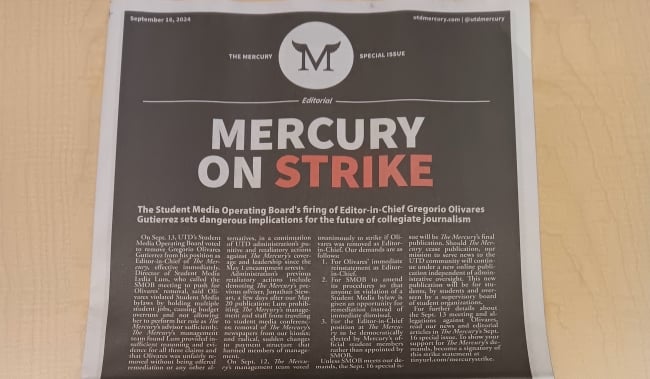You have /5 articles left.
Sign up for a free account or log in.

The staff of The Mercury are on strike and plan to launch an independent publication if their editor-in-chief is not reinstated.
Gregorio Olivares Gutierrez
Rising tensions over free speech between the University of Texas at Dallas and the staff of its student newspaper, The Mercury, came to a head recently when the newspaper’s adviser, a university employee, called a vote to fire the top editor.
In a memo to the Student Media Operating Board (SMOB)—a group of students and faculty who oversee the paper and other student media organizations—Lydia Lum, director of student media at the university, accused editor in chief Gregorio Olivares Gutierrez of violating three newspaper bylaws: holding a second on-campus job, overspending by printing extra copies of the paper and excluding her from newsroom meetings, thus preventing her from doing her job as adviser. (The Mercury’s staff published the memo, along with other documents and emails related to the situation, on its site after Olivares Gutierrez was fired.)
“I believe it’s unlikely [Olivares Gutierrez] will accept me as Mercury adviser given his counterproductive decisions and frequent adversarial remarks in my presence,” Lum wrote in the memo. “I do not believe that additional intervention attempts will produce a change in performance and therefore recommend immediate removal.” The SMOB ultimately voted 3 to 1 to fire Olivares Gutierrez, though only four of the seven voting members of the board were able to attend the Sept. 13 meeting, according to The Mercury.
Olivares Gutierrez—and the rest of The Mercury’s staff—see it differently. In their view, the firing is the latest in a long line of retaliatory measures the administration has taken in response to critical editorials they published following the arrest of 21 protesters at a pro-Palestinian encampment in May, Olivares Gutierrez told Inside Higher Ed. Shortly after the issue was published May 20, Lum’s predecessor as director of student media was demoted to assistant director.
The student journalists have demanded that Olivares Gutierrez be reinstated as editor in chief, that the media operating board’s bylaws be amended so that staffers can’t be fired without attempts at remediation and that the editor in chief become a democratically elected position, rather than be appointed by SMOB. If the university refuses to oblige, the newspaper team plans to break away and form an independent news organization called The Retrograde. They hope to begin publishing on Sept. 30.
Lum declined to comment on the matter, citing university policy. The university also did not provide comment.
The incident marks the second time in the past year that UT Dallas students have alleged the university is stifling their free speech rights; the previous incident occurred in November, when university leaders took down the campus’s “spirit rocks,” which students had long used to express political viewpoints, after pro-Palestinian and pro-Israeli graffiti appeared on them. The university did not respond to Inside Higher Ed’s request for comment at the time but told the student body in an email that the “messages on the rocks have been inconsistent with their original purpose and guidelines.”
Across the country, universities have quietly shut down speech about the Israel-Hamas war—including in student newspapers. According to Mike Hiestand, senior legal counsel at the Student Press Law Center, more student journalists have been chastised or punished for coverage of pro-Palestinian protests than for any other single issue in his 30 years at SPLC. (The SPLC is assisting with The Mercury’s case, although Hiestand is not the lawyer responsible.)
“[Student journalists] are trying to cover [the protests] the way they’d cover any other news event, but because it’s about this particular issue,” they and their advisers are subject to immense scrutiny, he said. In addition, reporters have been swept up in arrests and violence during protests and barricaded from their newsrooms due to restrictions on campus access, he said.
Alleged Bylaw Violations
Olivares Gutierrez said that all three of the charges Lum made against him are more nuanced than they appeared in her memo. He does hold a separate campus job outside of the paper, he said, but the university makes a distinction between student employees and student roles that receive stipends, and the bylaws only explicitly prohibit the former. His second job, as a peer adviser in the university’s housing department, was classified as the latter.
He also admits to ordering extra copies of certain editions of the paper during a period when readership was especially high but said he planned to order fewer copies of later editions to ensure a balanced budget. Previous editors had also varied the size of print runs, he said.
Finally, he disagreed with Lum’s assertion that she had been shut out of the paper’s editorial process, arguing that she was overstepping by trying to attend managerial meetings and review articles prior to publication—a practice called “prior review” that courts have ruled unconstitutional at public universities.
But Lum, a reporter since 1990, according to her LinkedIn page, claimed in the memo that the student media directors who preceded her were allowed to sit in on editorial meetings. She also cited Student Media Operating Board bylaws that said attending such meetings fell within the job’s description.
“Since I began my position with UT Dallas in July, Gregorio has discouraged his student media peers (and me) from doing my job. Gregorio has tried and failed to convince his peers (and me) that I should neither attend nor advise at routine planning meetings of the Mercury management team,” she wrote.
Hiestand said that an adviser seeking greater oversight of the operations of a college newspaper can be a red flag. In past cases, he has seen advisers hired by universities with the express purpose of “spying” on the newsroom and reporting back what student journalists are working on.
“It’s important to remember at a public college, an adviser is in the same legal category as any other school official. They’re in the same legal category as the president of the university,” he said. “If Gregorio thought this adviser was not being helpful in their editorial meetings … [if students] really don’t trust their adviser, they can say we don’t want our adviser involved in any editorial decision-making.”
Appealing the Decision
The staff of The Mercury, as well as some members of the university’s Academic Senate, raised concerns about how the vote was held, calling attention to the fact that three of the seven members of the SMOB—all students—could not make the meeting where the board voted to fire Olivares Gutierrez. According to the bylaws, removing any student media manager “shall require a majority vote of voting members of the board.”
Even if holding a vote with only four board members present is “technically legitimate, [it] leaves a bad impression,” Michael Kesden, a physics professor at UT Dallas and speaker of the faculty on the Academic Senate, said during a discussion of the issue at its meeting last week. “This firing should be a last resort. Seeing if there is broader support among the full seven voting members of SMOB, I think, is worth looking into.”
Olivares Gutierrez has since submitted an appeal, for which he is still awaiting a response. The newspaper team also alleges the appeal process was altered inappropriately; Jenni Huffenberger, senior director of marketing and student media, told Olivares Gutierrez in an email The Mercury later published that she would make the final decision.
But the SMOB bylaws state that the board should have first review on any appeals, and that appeals can be elevated to the senior director “if not resolved” by the board.
The Mercury is currently on strike, writing only stories related to Olivares Gutierrez's firing. Amid the controversy, the student journalists have received an outpouring of support from the UT Dallas community; a petition pushing the university to meet the newspaper staff’s demands has received nearly 1,250 signatures.




